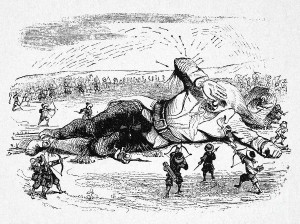For some reason literary treatment of the body out of control is both evocative and frequently avoided. You can think of Margaret Laurence’s Stone Angel which is touted as being such a great portrayal of a disintegrating mind, but one which loses the body in that equation. Where is the need to eat and eliminate? There is the cold, as much as that is possible in West Coast Canada, but the body is a reasonably coherent unit. An arguably better writing of illness, dementia, and aging, or how we may think of this affecting the integration of the body and the mind, is what Jonathan Swift does in Gulliver’s Travels.
His imagining of the rampaging body, the body that is a set of chaotic impulses and functions, caught in social settings and subject to social mores, is a very contemporary way of thinking of how our corporeal selves fit into our social sleeves. Gulliver is constantly caught being soaked in urine and feces, having to defecate and urinate, and generally suffering the humiliation of the outsize of miniscule body. He is too hairy for the Houyhnhnms, and too unalike a yahoo to be considered one of them, by the filthy beasts themselves. Gulliver absorbs this repulsion of self from his Houyhnhnm masters, and strives to fit it into his way of seeing himself. With the Laputans he realizes that turning your back on the body to valorize the mind is a kind of madness, which leads to bodily injury, social destruction, and even mental incoherence. As a six inch man in the Brobdingnagian kingdom, he suffers the shame of the undersize toy, and as a giant among Lilliputians he is derisive of the  pettiness of their desires. In one famous scene, he even urinates on the palace to put out a fire, an action he excuses by pointing to the lack of water to perform the service.
pettiness of their desires. In one famous scene, he even urinates on the palace to put out a fire, an action he excuses by pointing to the lack of water to perform the service.
Gulliver is shackled to his body every bit as much as us, as we have daily visited upon us the humiliation of flatulence, phlegm, and other bodily inevitabilities. Until the singularity, until we, like the worms in recent studies are uploaded to avoid what Charles Stross calls meatspace, we are doomed to drag this meat sack with us, enduring its aches and nausea, and the physicality of its plaints.
This is merely one chapter of this ancient story, however. With the body also comes the limiting factor that gives us our meaning in the world. It connects us to our animal cousins just as eating connects us to our families and friends and the offerings of our planet. The body is the conduit to the world around us, the feel of the winter storm and smell of the incipient rain, the taste of seaweed scooped up from the beach, the blinding glare of the sun on the waves, and the low, bone shaking rumble of the avalanche. Without it, we would have to invent new ways of being and interacting. Those proponents of the silicon singularity, so far, have only suggested we duplicate a meat space environment in the virtual world, but if we are shaking off the dross of the meat, and the senses and limitations with it, then we must revision how we are going to fit into that world. There is no reason to join with the Harry Potter magic of the mind uploaded, an apparent material world at our bidding, if we do not re-imagine who we could be under the altered conditions. The inevitable downward spiral of the Stone Angel’s life need not be ours, but if we think of the mind as chained to a duplication of the natural, we are more than chained to the meat past. If Gulliver changes completely by moving across what he acknowledges to be an arbitrary border, we could at least do the same.
